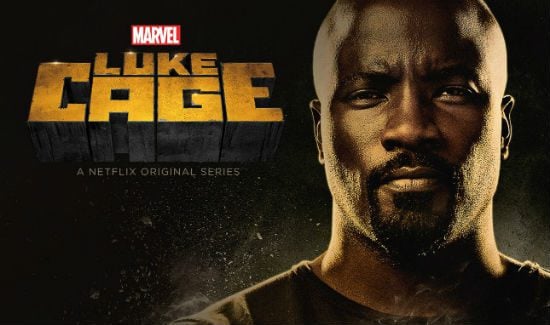Since Netflix crashed over the weekend, I’ll guess I wasn’t the only one who enjoyed Luke Cage. The reviews and think pieces are out — some of which are insightful and worth reading. This isn’t one of them — although I do have to commend a terrific cast.
I’ll try to avoid spoilers here (and please do so in comments below), but here are a handful of quick thoughts.
It was unexpected to see both the good and bad sides of being a PK (pastor’s kid) come to play a central role in the story. That was one of many surprising religious grace notes throughout, most of which were pretty spot-on — such as the specific verses adorning the walls of Pastor Lucas’ sanctuary, or the verse that inspired our hero’s choice of the name Luke Cage (who really should be Isaiah Cage, probably).
I especially liked the way that an over-highlighted Bible with way too much marginalia was used at one point in the show in lieu of the usual wall of clippings and torn photographs in the mad killer’s lair. I’ve seen Bibles like that, some of which are a beautiful testimony to a lifetime of reading and study, but others — like Diamondback’s — are just kind of creepy. (The furiously cross-referenced Bibles of some of my premillennial dispensationalist friends are a little bit of both.)
 Luke Cage got away a bit from what I most liked about Jessica Jones, which was expressed in a conversation the two title characters had over dinner in the previous show. Two superheroes asking each other questions about how they became like they are and I thought, here we go — always stuck rehearsing origin stories. But then he just says, “Experiment, you?” “Accident.” And that’s it. They escape the need to endlessly retell the origin stories and thus let the show focus on the other stories that those origins allow to unfold.
Luke Cage got away a bit from what I most liked about Jessica Jones, which was expressed in a conversation the two title characters had over dinner in the previous show. Two superheroes asking each other questions about how they became like they are and I thought, here we go — always stuck rehearsing origin stories. But then he just says, “Experiment, you?” “Accident.” And that’s it. They escape the need to endlessly retell the origin stories and thus let the show focus on the other stories that those origins allow to unfold.
One of my favorite things about the portrayal of Luke Cage in both shows is that he’s the rare super-strong superhero who acts like it. Luke Cage thus gets right something that a lot of shows (and comics) about such characters get wrong: Super-strength means never having to worry too much about leverage. Too many times the storyteller wants to show us that, for example, Superman is super-strong, so they show him lifting a car over his head. OK, fine, cars are heavy, so that makes him look strong. But the effect of that is undermined by having him square up, plant his feet, bend his knees, etc., first, behaving just like any non-superpowered mortal would if they were attempting to lift a heavy object. Superman is always lifting cars like he’s demonstrating proper technique for an OSHA safety video.
Mike Colter certainly looks the part of a super-strong hero, but what really sells the idea of Cage’s super-strength is the way he casually ignores the need for leverage and form that we mere mortals have to worry about when lifting a washing machine or throwing a punch. Colter — and all the stunt coordinators and choreographers on the show — really showcase this through flashbacks of a pre-superpowered Cage fighting. In those scenes he steps into his punches and puts all his weight behind them, but when we see him later, as a superhero with super-human strength, he tosses blows and foes with casual flicks and awkward angles. Contrast the big one-man-army set piece in Luke Cage with the famous hallway fight from Daredevil and you’ll see that these storytellers understand that super-powered superheroes wouldn’t have to fight the same way we do.
This is something the folks doing the new Supergirl show should study. Unlike Colter, Melissa Benoist doesn’t look like she’d have super-strength, but the show keeps trying to convince us she’s powerful by showing her fight like … well, exactly like her non-superpowered sister fights. They should borrow a page from Luke Cage and remember that she’s Supergirl — she doesn’t need leverage.
(I was supposed to be writing something else today, but since I wound up finishing Luke Cage instead, I wound up writing this.)












